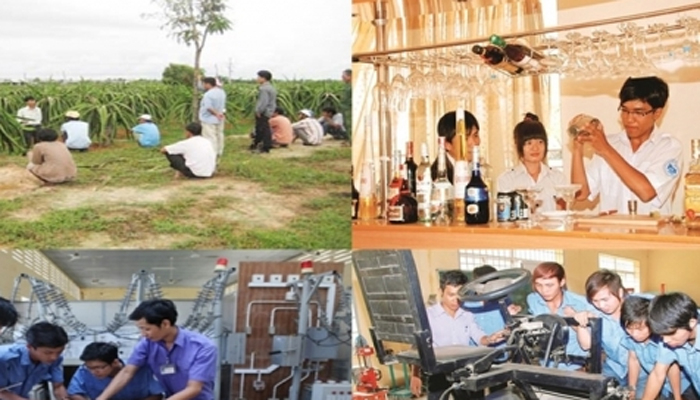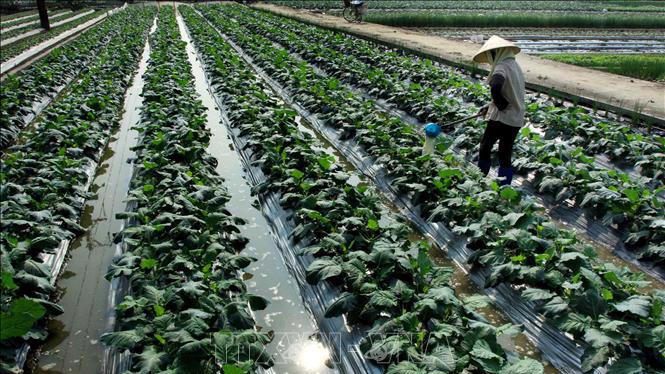Secretariat's Directive on innovating vocational training for rural workers in Vietnam
Recently, the Secretariat of Vietnam issued a directive on the reform of vocational training for rural workers.

Secretariat's Directive on innovating vocational training for rural workers in Vietnam (Internet image)
On July 10, 2024, the Central Committee of Vietnam issued Directive 37-CT/TW of the Secretariat on innovating vocational training for rural workers to meet the requirements of industrialization and modernization of agriculture and rural areas.
Secretariat's Directive on innovating vocational training for rural workers in Vietnam
In the new developmental stage of the country, the industrialization and modernization of agriculture and rural areas is one of the top tasks of the nation's industrialization and modernization; farmers continue to be the subject, the center of agricultural development, rural economy, and rural construction.
To make vocational training for rural workers in-depth, effective, sustainable, and substantial, the Secretariat requires Party committees, Party organizations, authorities, the Vietnam Fatherland Front, and socio-political organizations to focus on leading, directing, and well implementing several key tasks and solutions as follows:
- Comprehensively renew, enhance the quality and efficiency of vocational training for rural workers; update professions, standardize training content, assess the quality of training programs; strengthen occupational ethics education, knowledge on labor safety and hygiene, law, business, entrepreneurship, soft skills, and innovation for rural workers, meeting the requirements of industrializing and modernizing agriculture and rural areas. Emphasize practical training, especially from production and business practices; increase the application of science and technology, digital transformation in all stages of the training process. Research organizing higher education and intermediate level training in an open, flexible manner, suitable for local characteristics and learners.
Promote the proactiveness of learners, link vocational training with lifelong learning and building a learning society in rural areas, contributing to developing the comprehensive Vietnamese peasantry, with aspiration to build a prosperous and happy homeland, having educational attainment, innovation capability, and advanced production organization, meeting the requirements of industrializing and modernizing agriculture and rural areas.
Fundamentally renew vocational orientation and streamlining in general education in accordance with socio-economic development needs; improve the quality and efficiency of vocational counseling; focus on retraining rural human resources to meet the requirements of labor structure transformation, economic structure towards increasing the proportion of industry and services, associated with preserving and promoting rural cultural spaces, taking advantage of the Fourth Industrial Revolution, adapting to urbanization, population aging, and climate change, contributing to building a civilized, modern countryside.
- Party committees, Party organizations, authorities, especially leaders, must frequently lead, direct, strengthen inspection, supervision, and prioritize the quality and efficiency of vocational training for rural workers; develop appropriate vocational training plans in accordance with the labor market, socio-economic development plans, people's vocational training, and employment needs, associated with preserving and promoting rural cultural spaces, tourism potential in rural areas; organize vocational training linked with models of good farmers in production and business, aiming at economic structure transformation, large-scale production.
Complete the apparatus, enhance the effectiveness and efficiency of state management; build models connecting vocational education with the labor market in each region and locality; develop policies creating breakthroughs in human resource development, agricultural restructuring, and rural economic development.
Research, deploy programs, and issue vocational training policies for rural workers by 2030, concurrently with the implementation of the national target programs for the 2021-2030 period.
Continue to prioritize vocational training for policy beneficiaries, people with meritorious services, poor households, near-poor households, ethnic minorities, people with disabilities; pay attention to vocational training for students graduating from lower secondary schools transitioning to vocational training, encourage activities combining vocational training and general cultural education to enhance cultural knowledge and professional skills for students before entering the labor market; develop policies supporting job transition training for workers, especially those in industrial zones, discharged soldiers, and healthy elderly people wishing to join the labor market. Mobilize the participation and supervision of the Vietnam Fatherland Front, socio-political organizations in vocational training for rural workers.
- Widely propagate, enhance social awareness of the role, position, and importance of vocational training for rural workers concerning socio-economic development, new rural construction, sustainable poverty reduction, raising people's intellectual level and living standards in rural areas; the guidelines and policies of the Communist Party and the State on vocational training for rural workers and workforce and economic structure transformation in the process of industrializing and modernizing agriculture and rural areas.
Increase the awareness of Party committees, authorities, and people about the impact of climate change, the Fourth Industrial Revolution on agricultural economic development, career structure, and production levels in rural areas. Promote and replicate good models and examples after vocational training.
- Effectively utilize the opportunities of the Fourth Industrial Revolution. Vocational training for rural workers needs to be associated with training and fostering digital skills for people, contributing to the development of the digital economy and digital society in rural areas; develop high-quality human resources.
Enhance vocational training with advanced, modern production methods, suitable for green agriculture, organic agriculture, high-tech agriculture; promote multi-value integration, increase added value, and exploit regional, local advantages.
Implement investment, support policies for innovation, entrepreneurship, and collective economic development in rural areas. Implement programs and projects on training and retraining for career transition for citizens due to climate change and the impact of the Fourth Industrial Revolution.
- Ensure resources and conditions to improve the quality and efficiency of vocational training for rural workers. Complete support policies for training rural workers, especially on capital, production tools, product consumption, job introduction after vocational training. Implement ordering and task assignment mechanisms to enhance the effectiveness and quality of vocational training.
Strengthen private investment in mobilizing and effectively using resources for vocational training, especially in sectors and areas with conditions; encourage private, foreign-invested enterprises to develop vocational training facilities for rural workers.
Continue comprehensive investment, ensure physical facilities for vocational training, especially professions associated with economic structure transformation, with the industrialization and modernization of agriculture and rural areas.
Develop a high-quality teaching staff and vocational education management; mobilize the participation of scientists, artisans, entrepreneurs, good producers, skilled workers in vocational training for rural workers.
More details can be found in Directive 37-CT/TW issued on July 10, 2024.
Nguyen Ngoc Que Anh
- Key word:
- rural workers
- Vietnam
- Requirements for Application Software Functions of the National Land Information System from August 1, 2024
- General Provisions on the Mapping of Current Land Use Status from August 01, 2024
- Procedures for Mediation of Land Disputes from August 01, 2024
- General Department of Taxation requires strengthening fire prevention and fighting work
- Plan for the Implementation of Nam Dinh Province Planning for the Period 2021 - 2030, Vision to 2050
- Regulations on the scope of land statistics, examination in Vietnam from August 1, 2024
-

- Regulations on the scope of land statistics, examination ...
- 13:00, 12/08/2024
-

- Guidance on provincial-level land statistics in ...
- 12:30, 12/08/2024
-

- Legal statuses of artels, branches, representative ...
- 11:30, 12/08/2024
-

- Cases of forcible termination of provision of ...
- 11:00, 12/08/2024
-

- Newest guidance on connection to public telecommunications ...
- 10:30, 12/08/2024
-

- Requirements for Application Software Functions ...
- 17:33, 12/08/2024
-

- Objectives and Orientation of Public Investment ...
- 16:41, 12/08/2024
-

- Issuance of Technical Regulations on Soil Survey ...
- 15:37, 12/08/2024
-

- General Provisions on the Mapping of Current Land ...
- 15:30, 12/08/2024
-

- Procedures for Mediation of Land Disputes from ...
- 14:30, 12/08/2024
 Article table of contents
Article table of contents
